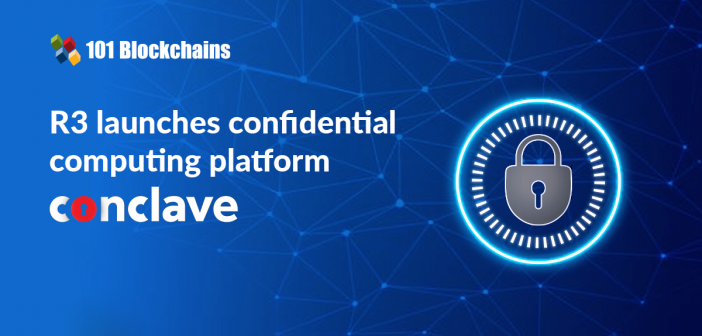Learn how blockchain truly works, master key definitions, and uncover what makes smart contracts so "smart." Dive into the fundamentals, gain valuable insights, and start your blockchain journey today!

- News & Updates
101 Blockchains
- on February 25, 2021
R3 Launches Confidential Computing Platform ‘Conclave’
Blockchain technology is currently looking at new approaches for ensuring security. Recently, the R3 blockchain integrated Conclave as the answer for confidential computing requirements of enterprises. R3 blockchain could use Conclave for secure aggregation of datasets for solving shared business problems without exposing actual data.
The official R3 community perceives the new confidential computing functionality as a favorable alternative for fraud detection, cost reduction, and the development of high-value multi-party analytics. Therefore, the news of R3 introducing a confidential computing platform creates better prospects for putting back data owners in control of the methods for processing data.
Watch Now: Webinar on Confidential Computing
UK-based software firm, R3, aims at providing the extensive benefits of enterprise-level security for partners as well as customers. With the launch of the new confidential computing tool, r3 could ensure that data stays encrypted while moving between enterprises for processing objectives.
R3 is basically an enterprise software firm with focused priorities in digital industry transformation. It can deliver specifically tailored distributed ledger technology for different types of businesses across various industries. The enterprise blockchain platform of R3, Corda, has been developed with the participation of the R3 ecosystem including over 350 institutions.
Corda has been highly functional for the transformation of all industries through the digitalization of systems and processes used by firms for connecting and transacting with each other. Corda serves as the open-source distributed ledger platform tailored for the financial sector owing to its abilities for managing complex transactions and restricting access to transaction data.
With Corda, R3 aims to offer a platform that could help in building services on top of it with reliable compatibility among network participants. Over the years, Corda has been able to gain the attention of various industries, including energy suppliers, insurance companies, government agencies, and hospitals. The foundation of Corda in blockchain databases offers the assurance for bringing many of the benefits of blockchain.
Want to know more about R3 Corda? Read more from our guide on R3 Corda now.
So, what are the potential implications of the introduction of Conclave in R3? Experts are commending the introduction of confidential computing on R3. Now, many sources are also deliberating over the potential implications associated with confidential computing. Many prominent names among the top technology companies are choosing confidential computing as an alternative security model.
Businesses are primarily focused on achieving better protection for data in various forms. The three foundations of data security focus on safeguarding data at rest, data in use, and data in transit. Protection of data at rest involves the use of methods such as tokenization and encryption.
Therefore, malicious agents cannot access any information when data is copied from a database or server. Protection of data in transit focuses on preventing unauthorized parties from accessing information during its movement between applications and servers. Users could find out multiple verified approaches for offering both forms of data security.
On the other hand, safeguarding data during use can be extremely complicated because data must be free of encryption and any other form of protection. However, lack of encryption and protection could imply that malware could dump the memory contents for stealing information. So, even if data stays encrypted on a server’s hard drive, it could be vulnerable to exposure in memory.
A confidential computing platform could leverage hardware-based techniques for isolating data, applications from operating systems, specific functions, virtual machine managers, and other privileged resources. Confidential computing basically isolates the sensitive data in a safeguarded CPU enclave during processing. The contents of the enclave, data under processing, and techniques for processing it is accessible only through authorized programming code.
Also Check: Hyperledger vs Corda R3 vs Ethereum
Even the cloud provider and any other entity cannot access the contents of the enclave. Companies are gradually depending more on public and hybrid cloud services while establishing the significance of data privacy on the cloud. With the introduction of blockchain cloud services, notable enterprise blockchain platforms open up various vulnerabilities.
Confidential computing primarily aims at offering better assurance to companies about confidentiality and protection of data o the cloud. As a result, confidential computing enables the migration of sensitive data and computing workloads to the cloud with ease. Therefore, confidential computing is a promising approach for addressing the vulnerabilities in the security of data in use.
Confidential computing tools use a hardware-based trusted execution environment (TEE). TEE is basically a secure enclave in a CPU, and the security of TEE depends on the use of embedded encryption keys. Additionally, the embedded attestation mechanisms could ensure the accessibility of keys for authorized application code. The Trusted Execution Environment denies access to the keys when malware or any unauthorized code attempts accessing the keys. As a result, confidential computing can ensure the protection of sensitive data in memory until the TEE approves its decryption for processing.
If you want to learn more about blockchain technology and confidential computing, make sure to check out our blockchain courses for that.
The growth of confidential computing has been focused largely on offering technology for data centers. Subsequently, confidential computing could be accessible to enterprise customers, especially in the health and finance sectors. Confidential computing could help in placing more sensitive data in the cloud.
The news of the arrival of Conclave on R3 has been commended across various circles. The CTO of R3, Richard Brown, stated that the platform would help companies in sharing critical datasets for solving mutual problems. Now, companies don’t have to expose their underlying data. He further added that the new platform could foster additional trust and enhance security through improving abilities for fraud detection. At the same time, enterprises could also work on introducing new types of analytics with the new confidential computing portal.
According to Brown, businesses should worry about their data when it leaves their premises while sharing data. Businesses must identify the ideal approach for ensuring that the shared data does not fall into the wrong hands”.
Mr. Brown further added, “Conclave basically aims at providing confidential computing capabilities for allowing firms to develop new applications and services. The applications and services have the capability for convincing customers about secure processing of data when they send it to businesses”.
Confidential computing has been focusing on a specific set of technologies for many years now. The technologies can enable encryption of data when it is processed by applications. Conventionally, decryption of data followed by processing and then re-encryption created many concerns about shifting highly sensitive information to the cloud. Almost 18 months ago, the Confidential Computing Foundation brought a group of high-profile tech companies.
The open-source group was tailored for developing standards regarding the emerging field. Subsequently, companies such as Google, IBM, Microsoft, and Intel have expressed more interest in the potential of confidential computing. So, confidential computing can introduce a new wave of innovation and growth in cloud computing.
R3 aims to offer such capabilities of confidential computing with Conclave. According to Richard Brown, the basic idea underlying confidential computing focuses on taking an existing workload and running it securely. On the other hand, Conclave presents a better perspective. Brown added that “Software firms offering live data processing services to customers could offer assurance to customers about the actions taken on the information sent by customers.”
For example, Conclave ensures that customers sending sensitive data to a bank could be sure that employees of the bank cannot access or see their data. Confidential computing will help in extending the trust of customers ahead in allowing service providers and application providers to convince customers about the protection of their data.
The CEO of R3, David E. Rutter, stated that “Effective sharing and pooling of proprietary data could unlock greater insights, commercial opportunities, and analytics. However, many companies don’t share proprietary data on the basis of inherent mistrust in the ways of using it. Conclave on R3 is ideal for resolving the issue of trust by leveraging technologies such as Intel SGX and confidential computing”.
Users could gain confidential computing capabilities with best-in-class technology alongside the wide-ranging experience of our business team and developers. Thus, the new confidential computing platform could empower customers to access a new era of privacy in sharing, processing, and analyzing data.
According to Ralf Helkenberg, Research Manager of European Privacy and Data Security at IDC, “Businesses have to walk on the fine line between regulatory implications of data protection and establishing data-oriented business outcomes.”
Intel’s hardware-based confidential computing technology powers the Conclave platform. As a result, it can enable businesses to speed up collaboration and innovation with sensitive data. At the same time, they can ensure better security, compliance, and trust.
The Director of ClaimShare at IntellectEU, Chaim Finizola, stated that “Many of the challenges for blockchain application developers focus on detecting uniqueness of data and users in a network.”
He further expressed a positive opinion regarding the use of Conclave for their insurance platform, ClaimShare.
According to Chaim Finizola, the confidential computing portal could help in preventing the claims of duplicate fraud. The platform could match private data of suspicious claims between insurers, and it could help in combating fraud in real-time.
We at 101 Blockchains, a blockchain education and research platform, offer a webinar on confidential computing, along with the R3 as the webinar partner. The webinar titled “Confidential Computing: It Promises to be the “Big Thing” of 2021- But What Is It?” could offer you insights into the growing landscape of confidential computing. The webinar would help you learn about analyzing data from multiple parties in a protected algorithm. You can also learn about verifying the approaches for data usage. Access the webinar here right now!
The introduction of Conclave will definitely spell a new benchmark for improving data integrity and privacy on blockchain platforms. R3 will get promising support through improving the trust factor for its massive ecosystem of customers and partners. The confidential computing functionalities of the new platform are all slated to bring transformation in data privacy on enterprise blockchains.




